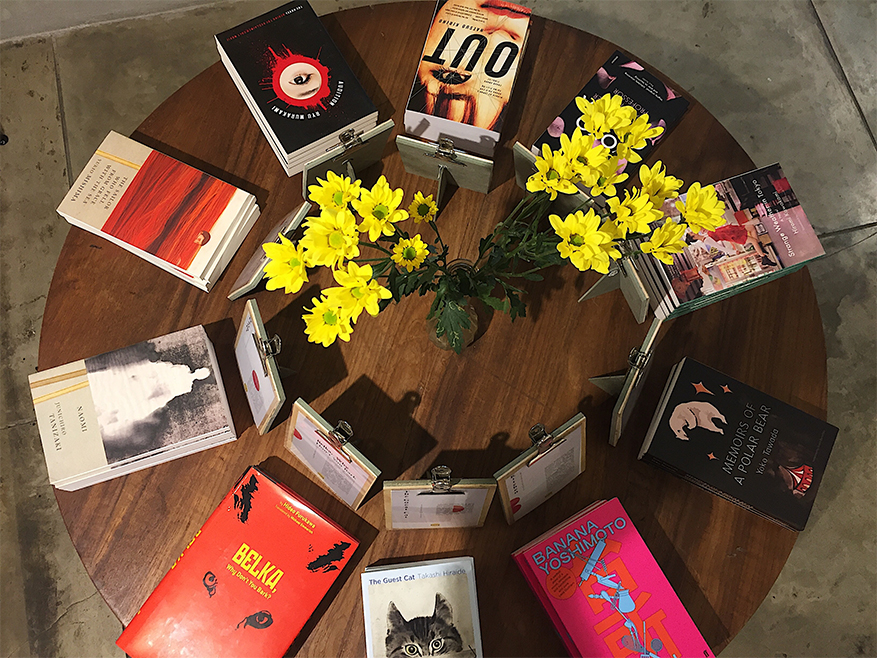Beyond Haruki
Aoko Matsuda liked Haruki Murakami’s books. She read his novels in high school, like many other Japanese readers. Although she understands the popular appeal of his books, as a reader and writer herself, she is more drawn to other voices in contemporary Japanese literature. “I wish more international readers could read other daring, experimental Japanese writers beyond Haruki Murakami,” Aoko said.
Back in May 2016, we attended a talk in Kinosaurus called Haruki Murakami and New Writings from Japan, in which Aoko was one of the speakers. We’ve read some Haruki novels and enjoyed all the cats, jazz, whiskey bars, surrealist touch, and loneliness in modern Japanese life in his books, but we were curious about other contemporary Japanese writers.
After the event, we came up to Aoko to ask for her recommendations on Japanese writers to read. She pointed us to the Monkey Business, a literary journal that translates stories, poems, essays, novel excerpts, and manga from contemporary Japanese writers, including her short story told from the point of view of the Japanese national anthem. She also gave two names in particular, Yoko Tawada and Rieko Matsuura, saying that she found the most exciting literature in Japan to be written mostly by women authors.
We decided to follow Aoko’s recommendations right away. We spent the next month searching for the world of Japanese contemporary writers for a ‘Beyond Haruki’ selection at POST Bookshop, and we were amazed by the books we discovered.
There were the esoteric and experimental, the ones recommended by Aoko. Rieko Matsuura turned out to be the author of The Apprenticeship of Big Toe P, a novel that started with a woman who woke up one day and found that her right toe had turned into a penis. She told herself that it is better to have it on her toe than if it sprouted on her forehead and went on to live her life where her toe-penis took her. Yoko Tawada, on the other hand, has left Japan to live in Germany and started writing in both Japanese and German. None of her books are the same. The Bridegroom Was A Dog is a slim novella that grows more absurd with each page, Memoirs of a Polar Bear is a commentary of different eras in Germany rom the eyes of polar bears, and her latest book, The Emissary, is a dystopian take on the future of Japan where children are dying while the elderly live longer. The more we read her, the more we love her, and she is now one of our favorite authors.
There were the masters on melancholy of everyday life. We never thought that mathematics could be poetic, until Yoko Ogawa’s The Professor and the Housekeeper connects mathematics, memory, and life. We found comfort in Hiromi Kawakami’s gentle prose, whether she was writing about a slowly budding love affair between a woman and her former school teacher or life in a thrift shop. Her characters found solace in small things around them: sake, pie, tonkatsu, and observations like how a shadow flickers like ghost in daylight.
There were the names we’ve only heard but have yet to read. Yukio Mishima, the right wing writer who was the competition for Yasunari Kawabata’s Nobel prize. Ryu, the original Murakami, who writes thrillers that kept us reading to the wee hours of the morning and chilled us to the bone. Banana Yoshimoto, whose prose made us feel like we were swimming on a rainy night - a bit sad, but comforted at the same time.
Being a tiny bookshop, smaller than we are right now, we could only stock one copy of each title. They were all gone in one weekend. Excited by our discovery, we kept finding and recommending other Japanese authors. The search became easier as more contemporary Japanese authors are being translated into English, possibly riding the path paved open by the international success of Haruki Murakami.
Two years after our small Beyond Haruki exhibit at POST, we are delighted to share some of our favorite Japanese novels with you through our thematic collaboration with Aksara. We hope you find a new writer you like, become reacquainted with an author you loved, or get to read a book you’ve been curious about.
Happy reading!
POST Bookshop


